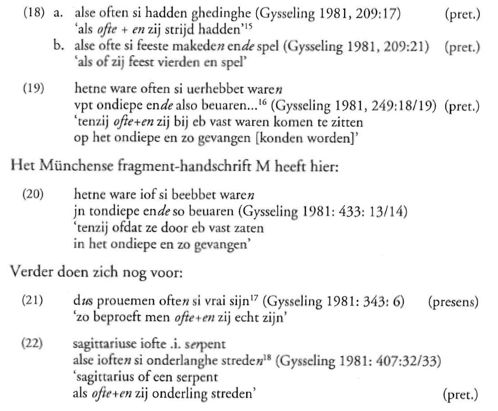Ton Goeman (1997a): De zeldzaamheid van Comp-agreement in taaltypologisch en historisch opzicht. Voorkomen buiten de Germania en datering van voegwoorcongruentie-vormen in het Nederlands. In: Hoekstra, E. en C. Smits (red.)(1997): Vervoegde Voegwoorden. Lezingen gehouden tijdens het Dialectsymposion 1994 [Cahiers van het P.J. Meertens-Instituut 9], Amsterdam: P.J. Meertens-Instituut, 87-111. ●The rarity of Comp-agreement in typological linguistic and historical linguistic respect. Incidence outside the Germanic languages and dating comp-agreement forms in Dutch●
[on dating Comp-Agreement in Dutch historical dialects]
Download here (zipped)

Plural Comp-agreement in Maerlant (in of before AD 1287)
Ms D shows Comp-agreement, Ms M does not.
Summary
Comp-agreement is not an isolated phenomenon typologically. It is occurring also outside the Germanic languages. As regards its internal Dutch linguistic history, it is shown that it is not a recent phenomenon. 2nd Person sing. agreement on Comp was already known for Middel Dutch and Middle High German.
I trace now plural agreement on Comp to the early Middle Dutch of the coastal regions. The older attestations come from the pens of clercs, who are hasty, have to solve a problem of rendering a Latin structure in Dutch, and -in poetry- in manuscripts were clitic pronouns were used instead of the normal iconic full ones.